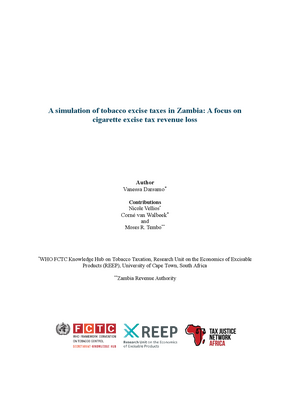A simulation of tobacco excise taxes in Zambia: A focus on cigarette excise tax revenue loss

This report presents the results of the Tobacco Excise Tax Simulation Model (TETSiM) for Zambia. The TETSiM simulates how changes in cigarette excise taxes impact cigarette consumption, smoking prevalence, excise tax revenue, cigarette prices, among others. The model focuses on improving health outcomes and increasing government tax revenue. For Zambia, the model was calibrated for a retrospective analysis that simulates the loss in cigarette excise tax revenue between 2016 and 2022 due to an investment incentive.
Tobacco taxes have rarely increased in Zambia, despite high inflation. The inflation-adjusted price of manufactured cigarettes has been falling since 2002. In 2016, Zambia implemented an investment incentive to attract foreign investment and foster local manufacturing, which led to the opening of two new tobacco manufacturing plants. Zambia has a mixed tax structure with an ad valorem tax at 145% of the cost, insurance and freight value or ZMW 7.10 per pack of imported cigarettes (in 2022), whichever value was higher. Locally-manufactured cigarettes are taxed 25% of these values due to the tobacco incentive. The excise taxes have not kept pace with inflation and income growth, and cigarettes are becoming more affordable over time. The incentive violates Article 5.3 of the World Health Organization’s Framework Convention on Tobacco Control (WHO FCTC), which Zambia ratified in 2008.
Tobacco use costs Zambia ZWM 2.8 billion (USD 299.3 million) annually, equivalent to 1.2% of Zambia’s gross domestic product (GDP). Tobacco production only contributes 0.4% to the Zambian GDP. The Zambian government is losing further from the investment incentive that has had no impact on curbing tobacco use, and only a marginal effect on job creation, with 170 jobs created since its implementation.
To ensure that cigarette taxes are effective at curbing cigarette consumption, increasing government revenue, and that Zambia complies with the WHO FCTC, we recommend the following:
1.Zambia abolishes the investment incentive for all tobacco products.
2.Zambia implements a simple tax structure that is easy to administer and revise, collapsing the tax tiers of the specific tax.
3.The specific excise tax is revised annually in line with inflation and income growth.
